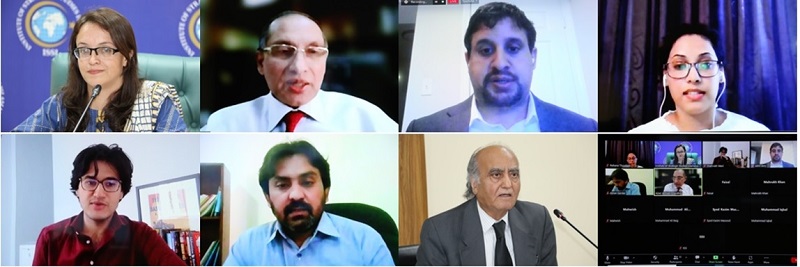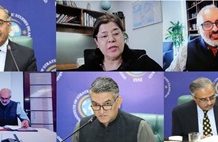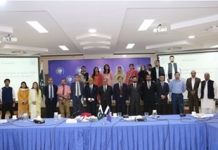Press Release
Panel Discussion: “Sri Lanka’s Economic Crisis and What Pakistan needs to Learn”
May 17, 2022

The Centre for Strategic Perspectives (CSP) at the Institute of Strategic Studies Islamabad (ISSI) organised a Panel Discussion titled, “Sri Lanka’s Economic Crisis and What Pakistan needs to Learn”on May 17, 2022. The discussants included: Dr. Akhil Bery, Director of South Asia Initiatives, Asia Society Policy Institute, Washington DC; Mr. Sharukh Wani, Economist, International Growth Centre, Blavatnik School of Government, University of Oxford; Ms. Rehana Thowfeeq, Economist, Advocata Institute, Sri Lanka; andMr. Imran Sardar, Research Analyst, Institute of Regional Studies, Islamabad.
In her introductory remarks Dr Neelum Nigar, Director, CSP, welcomed the speakers and stated that South Asian countries, particularly Pakistan must take the Sri Lankan crisis as a learning lesson and must understand the reasons that led to the economic catastrophe. The policymakers in Pakistan must come up with clear policy options to avoid the Sri Lankan crisis.
In his welcomeremarks,Ambassador Aizaz Ahmad Chaudhry, Director General, ISSI, stated that what is happening in Sri Lanka is a sad situation but the good thing coming out is that the Sri Lankan government is taking up the challenge and not shying away from the owing the problem. This is a step in the right direction.
During the panel discussion, Mr. Akhil Berysaid that the debt crisis, alienation of key partners, and over reliance on China are three major reasons for the current crisis in Sri Lanka. He further added that India is currently leading the way to help Sri Lanka to get out of the existing situation. While commenting on factors which led to the economic crisis in Sri Lanka. Ms. Rehana Thowfeeqsaid that both issues, the impending structural issues and decisions taken during the COVID-19 pandemic have impacted the Sri Lankan economy. She further added that the series of bad economic decision based on populist moves, led to the path of abandoning fiscal consolidation in the country. This ultimately led to the current crisis the economy is crippling with.
In his remarks about the current state of Pakistan’s economy, Mr. Sharukh Waniadded that bad policy decisions are leading the Pakistani economy on the downward spiral. This is partly due to lack of political ownership arising out of political instability in the country. On the policy option available, Mr. Wani emphasized that the government needs to own up the problem and take tough decisions in order to stabilise the economy. Also, the impending macroeconomic structural issues need to be addressed to avert the emerging crisis beforehand. Mr. Imran Sardaralso stressed that the global geopolitical dynamics along with Pakistan’s dependence on major powers have hugely impacted its economy. Pakistan’s current geo economic policy needs careful balancing approach, and deep understanding of Chinese role in its economy also needs to be focused on.
Later, an interactive discussion session was held, in which the speakers responded to questions raised by the audience.
Ambassador Khalid Mahmood, Chairman BoG, ISSI concluded the discussion by saying that one should live within one’s means as going beyond the limits and investing in unproductive solutions could lead to debt trap like situation. Therefore, right decisions at the right time are need of the hour if Pakistan is to avoid Sri Lanka like situation.











